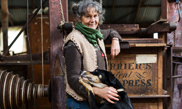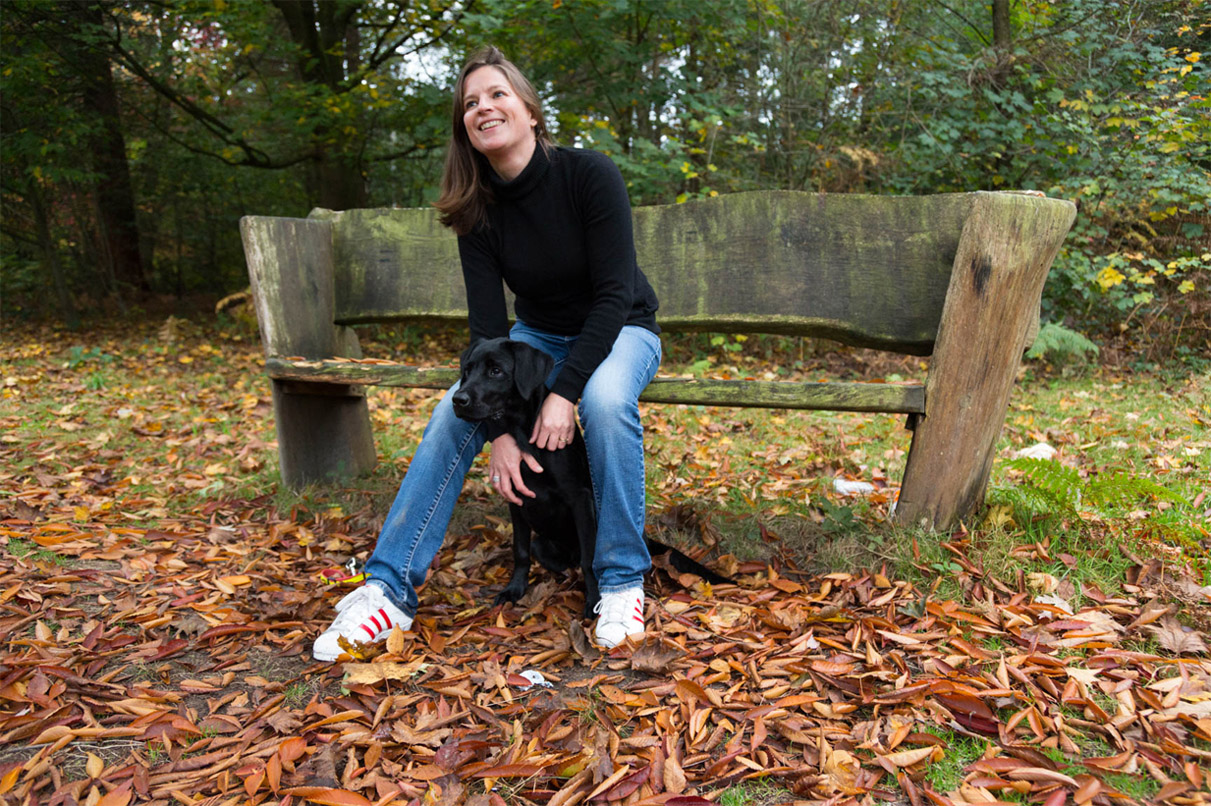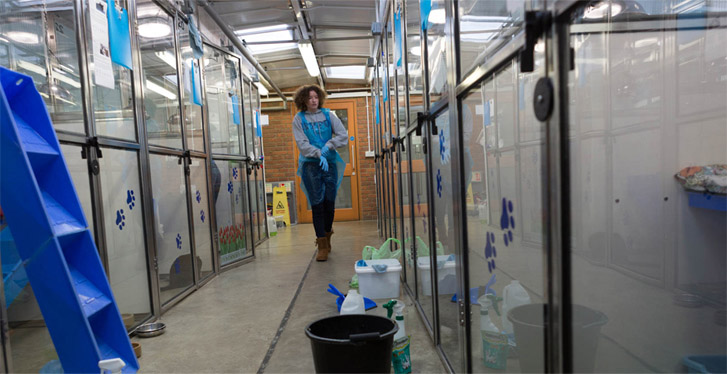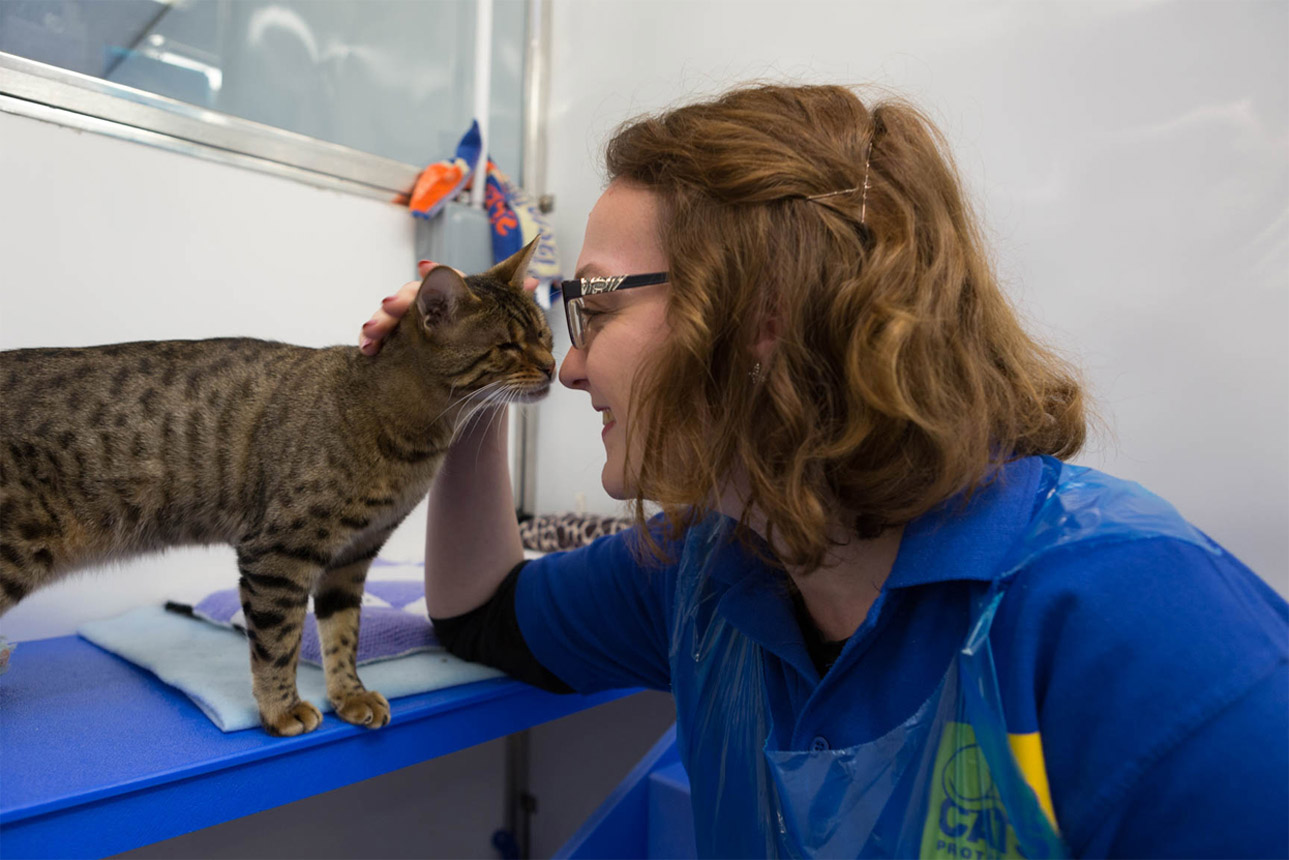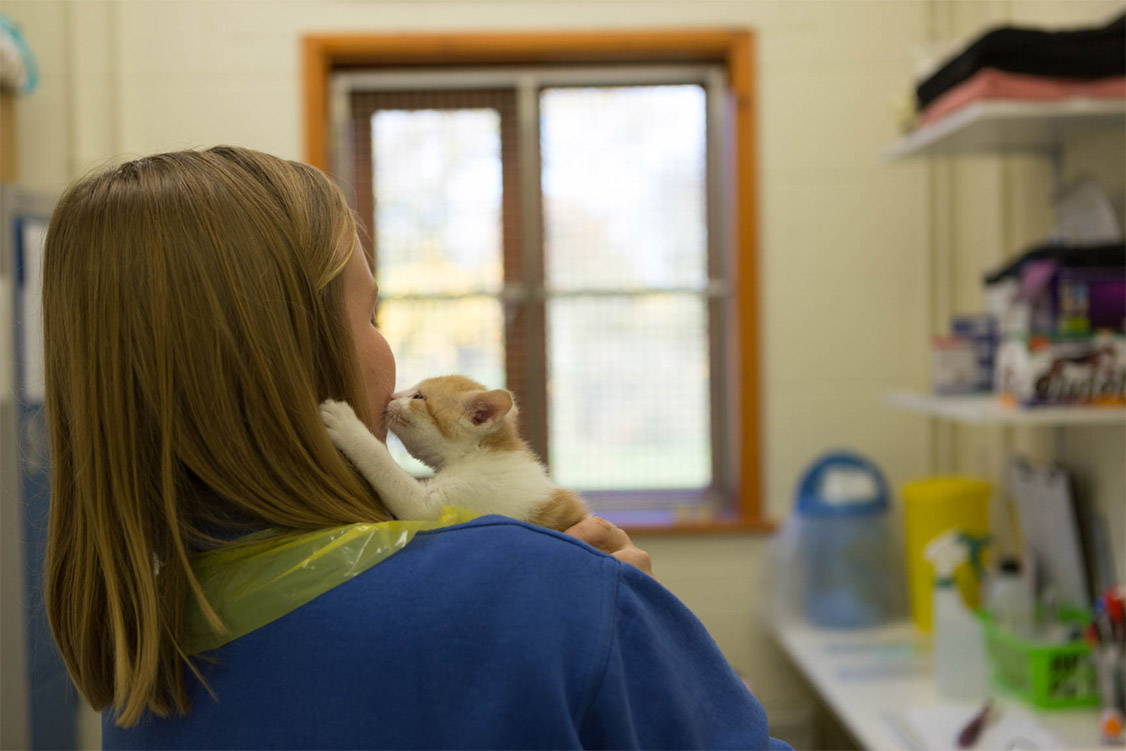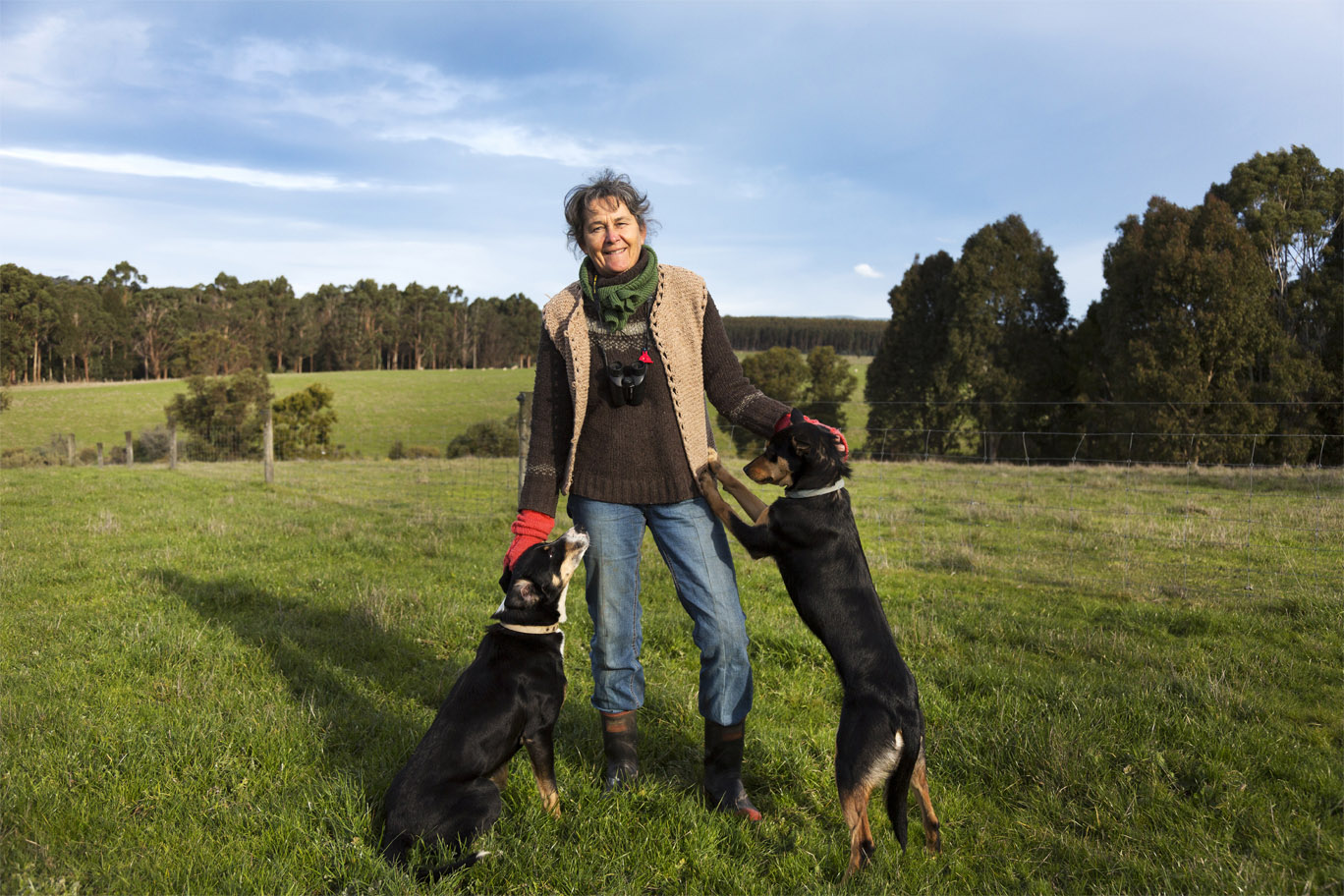Story at a glance
-
A Lifetime of Mutual Care
When a pet adopts you
-
Improving Pet Health
Longer, happier lives together
-
Pet Protectors
Finding happy, healthy homes
One of the cats just stared at my wife and that was it – it was like she was saying ‘I’ve adopted you now’.”
Mark,Cats Protection UK VolunteerThe first thing I say when I get home is ‘where are the cats?’ Jasper will sit on my knee, while Tilly always wants to play... It’s just really nice to come back to.”
Mark,Cats Protection UK VolunteerUnderlining his point, Tilly dashes after a length of string that floats across the floor, criss-crossing the room with wild abandon. If she’s troubled by the presence of a photographer in her space, she doesn’t show it.
Mark lives in Essex, a county in eastern UK. Castles dotting the countryside and tongue-in-cheek debates about whether its capital, Chelmsford, truly deserved its status as an official city remind visitors that life is a bit different outside London.
Here, three cats have found their adoptive home, and while Mark may be giving the interview, there’s little doubt about who’s grabbing the spotlight.
“Once you start playing with her she’s fine, but you ignore her at your peril!” he explains.
Mark – who volunteers at a cat rescue Center – had every intention of adopting just one cat, but this became two when he couldn’t bring himself to split up two siblings.
“One of the cats just stared at my wife and that was it – it was like she was saying ‘I’ve adopted you now’.”
Later, when that wasn’t enough, they were joined by another kitten.
It’s a sentiment many pet owners will recognise. In the UK, where some 51 per cent of households own a pet, Jasper and Tilly are two of an estimated population of 10.3 million cats – bigger than the population of London.
And research suggests that our pets are giving millions of people across the world just the same warmth Mark describes.
In one US study, 97 percent of doctors reported their pet-owning patients had “moderately” or “significantly” better mental health than their non-pet owning counterparts.
Others point to the positive effect a pet can have on symptoms of depression, loneliness, feelings of worthlessness, and even post-traumatic stress syndrome.
There are physical benefits too; people with pets often have lower resting blood pressure, and are thought to be at lower risk of cardiovascular disease than their non-pet owning counterparts.
These benefits are no surprise to life-long pet owners though. Christine works in Zaventem, Belgium for a world-leader in medicines for pet health.
She grew up with “horses, dogs, cats, chickens - everything!” and recently adopted a chocolate Labrador. His wide, brown eyes and giddy barks reveal a puppy with an infectious energy
“And as an adult, you can come home after a bad day and your pet can really make you smile.”
Christine’s colleague, Francis, agrees.
It feels great to come home to a healthy, happy pet and go out for a little walk, or play together. It’s really important.”
Christine,Customer Services Coordinator in Animal Medicines IndustryFrancis believes good health and proper medicines are essential in preserving the important relationships we have with our pets. He leads a team of researchers who have devoted their careers to the cause.
“I work in vaccine development for pets, and I know that every new molecule we bring through from development to production will mean an animal will be healthier,” he says.
“It’s a very passionate area to be working in. Every morning when I come to work I’m thinking about what we can do to bring more health and happiness to pets and their owners.”
Good pet ownership, he believes, is ultimately about ensuring the benefits our pets bring to us are returned.
Francis explains: “Our pets are such important companions, and in that context, we need them to be healthy. And that means being aware of the diseases that affect our animals.”
Our pets are such important companions, and in that context, we need them to be healthy.”
Francis,Animal Medicines Researcherpet protectors
finding happy, healthy homes
Sadly, preventative healthcare is far from routine for many owners. Returning to the UK, a recent report from veterinary charity PDSA found that more than a third of kittens didn’t have a primary vaccination course.
This is actually down on the figure for the previous year, prompting president of the British Small Animal Veterinary Association John Chitty to issue a stark warning: “It is genuinely worrying to see the fall in numbers of pet animals receiving primary and booster vaccinations,” he said.
Needless to say, vaccination is a necessary part of daily life at UK-based Cats Protection, a network of charity-run centers, where thousands of cats are re-homed each year.
At the Chelmsford branch, just a few miles from Mark’s home, neat rows of airy, double-glazed units form temporary homes for cats who might be unwanted or neglected.
Each space is bursting with baskets and blankets, and intersected with little runways to ensure their feline residents remain active.
“We have regular vet visits every week,” explains deputy manager Paula.
“Vets will vaccinate our cats, carry out health checks and check up on any post-surgical operations we might need to do. All cats need a minimum veterinary standard before they’re ready for re-homing.”
In Mark’s case, this care is continued after adoption; while some 22 per cent of UK cat owners feel vaccination is unnecessary, he feels it’s absolutely essential.
“You hear about all these ailments they catch,” he explains. And so for me, I don’t care what it costs, because it’s a cat – an animal. Why let them suffer when I can pay for them to have a vaccination once a year?”
Like many pet owners, Mark became all too aware of the emotional impact of an animal’s poor health when he lost a cat several years ago.
I’ve never seen an animal die and that was traumatic for me. We all just burst into tears, because there’s really nothing else you can do.”
Mark,Cats Protection UK VolunteerMark’s devotion to his cats is far from unique. For many of us, pets are part of the family, offering support, comfort and companionship, often at the times when we need it most.
As Paula summed it up, “You're not going home to an empty house. There's someone there that you can talk to if you want to, just keep you company.”
Through vaccinations and other innovative new treatments, Francis, Christine and others in the animal health sector hope to provide owners the chance to give benefits in kind.
Spotlight: Hardest Workers on the Farm
In the foothills of the ancient, verdant forests of the Otway Ranges in Australia, Jill Stewart produces prime lamb on her family farm.
It’s said that the nation rides on the sheep’s back, but the unsung hero of this quintessential Australian industry is the humble sheepdog. Indeed, the Australian Federation for Livestock Working Dogs estimates that each one of these animals has an average value of $40,000 over their working lives.
Their presence on farms across the continent is about more than the bottom line, of course; these dogs are often members of a working family, and their husbandry is an emotional investment too.
“If your lambs aren’t well cared-for, you’re not going to make much money,” explains Jill.
“And it’s the same with my working dogs. I have them on really high-quality food, and some farmers will say to me: ‘why do you spend all that money on food?’.
“But I tell them, ‘my dogs are athletes – they’ve got to go out there and bring in sheep and run all day – they need to be in really good condition to do that.”
Jill’s time with dogs goes beyond their work with sheep; she’s also a trainer of sheepdogs who believes their wellbeing is essential to their performance.
“If I want these dogs to be able to keep doing this into a good age, they need to be very well looked after.”
Health, husbandry and heritage
Next storyOther stories
- A Lifetime of Mutual Care
- Health, Husbandry and Heritage
- Pride in Profession
- From Lab to Land
- The Long Walk towards Rabies Eradication
- Healthy Animals Drive Economic Growth
- Responsible use: the responsibility of us all
- Innovation for Sustainable Production
- Farming to feed a growing world
- Protecting Animals Protects People





